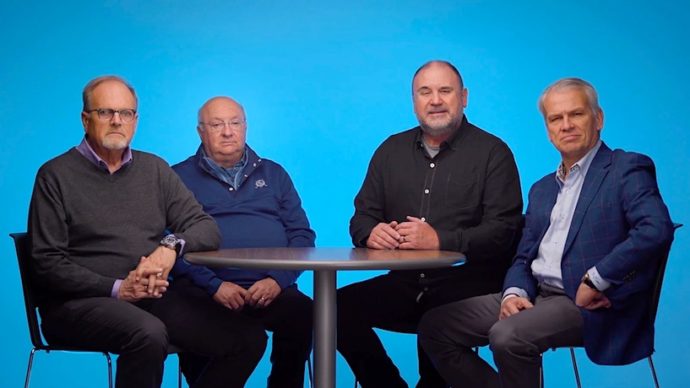Popular theology routinely enables powerful men to rehabilitate their public image after their misconduct goes public. This pattern applies especially to men known for their dedication to Jesus. The standard line holds that the man has repented of his sin and found forgiveness. Therefore, just as Jesus no longer holds his sin against him, neither should society. Far too often, the social harms attached to his transaction are ignored, and no transparent process for rehabilitation and reformation occurs. In late November two such cases hit the news, each reflecting how powerful White men protect one another in the wake of moral failure.
Earlier this year allegations of sexual assault surfaced in a report on sexual abuse in the Southern Baptist Convention. The report’s most prominent charge pointed to former SBC president Johnny Hunt, who resigned his Georgia megachurch pastorate. Then, in late November, Hunt was declared restored to ministry by four colleagues after what they described as an “intentional and an intense season of transparency, reflection and restoration.”
Also last month, Auburn University hired Hugh Freeze as head coach of its football program. In 2017 the University of Mississippi forced Freeze to resign as head coach after discovering he’d been using his school-issued cell phone to call an escort service. Freeze was hired the following year by Liberty University, where he coached until he left for Auburn, just weeks after the announcement that his contract had been extended through 2030.
Just this summer, Freeze contacted a former Liberty student, one of among 20 who’d taken legal action against Liberty for failing to pursue their sexual assault and other Title IX charges seriously. Chelsea Andrews criticized Liberty for hiring an athletic director, Ian McCaw, who’d left his position at Baylor precisely because of his department’s failure to act on sexual assault complaints. Unsolicited, Freeze messaged Andrews that she didn’t know what she was talking about and that McCaw was “the most Jesus-like” leader he’d been around.
These rapid restorations fit a common pattern:
- First, a powerful and highly compensated White man, proclaimed as a Christian leader, commits an offense against a woman;
- Then, these Christian leaders appeal to Jesus’s forgiveness as the basis for their restoration to public leadership;
- Finally, other powerful White men, all of whom have everything to gain by his retention of power, vouch for his reformation.
Popular Christian piety contributes to the problem. American Protestant Christianity emphasizes a quick and easy forgiveness: tell Jesus you’re sorry, and you’re forgiven. Not only are you forgiven, your sins now stand “as far as the east is from the west.” That’s good news, and I believe it, but it has nothing to do with one’s qualification to hold moral responsibility in an institution. God may forgive a person, and so may we. But when someone has demonstrated that they cannot be trusted with authority, with finances, or with the safety of persons under their care, institutions should exercise extreme caution in restoring them to leadership. Shallow forgiveness, excised from the social contexts in which vulnerable people face evils like sexual violence and intimidation, poses a grave danger.
Quick and shallow forgiveness haunts American Christianity in three primary ways. First, it focuses upon one individual, the offender, without taking full account of the harm that person has caused. When we focus upon transgression as a matter that lies between an individual and Jesus, we set aside the harm that’s already occurred and may occur to other people. We also obscure the distinction between personal forgiveness and institutional responsibility.
Second, shallow forgiveness blurs the distinction between forgiveness and healing. Hunt and Freeze clearly have learning to do. Given that Hunt’s transgression was found out in 2010, his denials and minimizations this year indicate that he hasn’t grasped how his behavior puts women and churches at risk. Freeze lost a lucrative job in 2017, but as recently as this summer he used his position to tell a victim of sexual violence she should stop criticizing the institution he served.
Third, shallow forgiveness ignores institutional context. Neither restoration occurs in a vacuum. The Southern Baptist Convention, the nation’s largest Protestant denomination, remains in crisis after receiving the very report that revealed Johnny Hunt’s misconduct. The Guideposts Report uncovered hundreds of instances of sexual abuse in Southern Baptist life and a “pattern of intimidation” on the part of Southern Baptist Executive Committee members toward sexual abuse victims (p. 176).
Meanwhile, Auburn University has its own troubles concerning its handling of sexual assault cases. When USA Today contacted over 100 universities to request public records concerning Title IX complaints, Auburn was one of six who failed to comply. Auburn didn’t even respond to multiple requests for information, which it’s obligated to provide. Hugh Freeze’s story intersects with Liberty and Baylor universities, two vocally Christian universities with established reputations for minimizing sexual abuse complaints. The Department of Education is, as of right now, investigating Liberty.
Robert P. Jones, the author of White Too Long: The Legacy of White Supremacy in American Christianity, demonstrates that a theology of easy and individualized forgiveness distorts Christianity’s moral sensibilities. When sin is located “between Jesus and me,” we alienate personal conduct from social structures, like institutions. Significantly, White Protestants are far more likely to individualize sin and forgiveness than are Black Protestants.
One of the effects of this pattern has been the failure of churches and their institutions to interpret racism as a social and structural matter rather than a moral failing of individuals. It prevents such organizations from inspecting how their institutional patterns might generate discriminatory outcomes and from considering how their histories still play out in the present.
Many would argue that a man who’s implicated in sexual assault or sexual harassment should never hold an executive position in a church or a university. Most responsible institutions have policies that discourage such hires. The University of Illinois system requires a thorough vetting of job candidates with histories of sexual harassment that includes the nature of the position under consideration, whether the person’s conduct has abused institutional power, and evidence of rehabilitation. An institution that hires Hunt or Freeze amplifies its liability should legal action take place.
At a minimum, any process designed to foster such restoration should attend to those who’ve been harmed and include both women and persons with expertise in the field. For example, the Guideposts Report recommends that Southern Baptists form an independent commission to oversee reforms in the area of sexual abuse. That commission, according to the Report, should include “a balanced representation of male and female members, including survivors of sexual abuse, and expert advisers who are trauma-informed.”
Nothing in the public record suggests that either Hunt or Freeze entered into a process of genuine accountability that includes review by outside parties or attends to the women they’ve harmed. Their offenses are fresh. Hunt’s process of restoration implies a confession that he acted wrongly. Because Hunt purportedly accepted similar counseling in 2010 after the alleged assault, his 2022 denials indicate that his early “confession” and treatment did not produce genuine repentance.
Now, four pastors—all White men who claim to be personally indebted to Freeze—have affirmed his restoration on their own authority. Hunt’s “intentional and…intense season of transparency, reflection and restoration” occurred only under their supervision.
Freeze’s unsolicited direct messages occurred even more recently. It took him being hired by Auburn for him to utter a not-so-public apology—one that didn’t mention Chelsea Andrews by name so far as we can tell. Yet Auburn’s athletic director and president have both attested that the university performed a thorough vetting of a man who, until then, hadn’t even acknowledged he’d done anything wrong in harassing Andrews.
Moreover, no one from Auburn even contacted Chelsea Andrews concerning Freeze’s most recent incident. Auburn very much wanted Hugh Freeze to coach its football program, tenth most valuable in the country with an annual revenue of $117 million. Freeze will make $6.5 million per year guaranteed over six years.
Pastors and football coaches carry significant responsibility for women’s welfare. Pastors routinely deal with issues such as struggling marriages, domestic violence, and sexual harm. Football coaches must confront sexual misconduct allegations against program members, which include over 100 student-athletes and dozens of paid and volunteer employees. No evidence suggests either man has changed enough to handle those issues responsibly because the only people who vouch for them are too deeply compromised to be entrusted with the care of an organization afterward.
As a Christian, I wish Hunt and Freeze an abundance of mercy, forgiveness, and restoration. Even more fervently, I hope those they’ve harmed and disappointed will find healing and restoration of their own. We all fail—Christians apparently no less often and no less severely than anyone else. But many Christians, and many people in general, fail to distinguish between personal failings and institutional accountability.
Somehow Johnny Hunt and Hugh Freeze have avoided scrutiny from neutral experts, including qualified women. Other powerful White men—again, men who hold vested interests—have stood in for them. And because Johnny Hunt is an effective preacher and Hugh Freeze a winning coach, people are ready to believe them.





